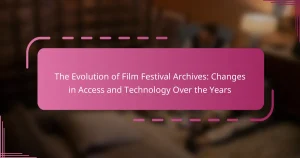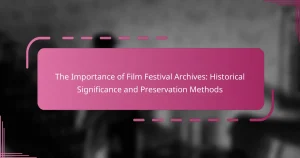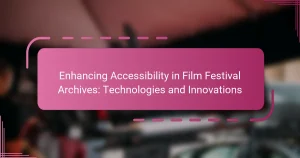Film Festival Archives are essential collections that document the history and activities of film festivals, including films, promotional materials, and unique content like interviews and behind-the-scenes footage. These archives serve as valuable resources for researchers, filmmakers, and the general public, contributing to the understanding of cinematic trends and cultural significance. Accessing Film Festival Archives can be done through official festival websites, dedicated archival institutions, and online databases, with many archives offering digital collections. The article outlines effective strategies for exploring these archives, including identifying specific interests, understanding cataloging systems, and engaging with archivists for expert guidance while respecting copyright and usage rights.

What are Film Festival Archives?
Film Festival Archives are collections that preserve and document the history of film festivals. They typically include films, promotional materials, and records of festival activities. These archives serve as a resource for researchers, filmmakers, and the public. They often contain unique content, such as interviews and behind-the-scenes footage. Film Festival Archives contribute to the understanding of cinematic trends and cultural significance. Many archives are accessible online, providing digital access to their collections. Some notable examples include the Cannes Film Festival Archives and the Sundance Institute Archives. These archives play a crucial role in film preservation and education.
How do Film Festival Archives serve the film community?
Film Festival Archives serve the film community by preserving and providing access to films and related materials. They collect films showcased at festivals, ensuring the preservation of diverse cinematic works. These archives also document the history of film festivals, creating a valuable resource for researchers and filmmakers. Additionally, they facilitate educational programs and screenings, fostering appreciation for film art. Access to these archives supports film studies and promotes independent filmmakers. Many archives collaborate with universities and institutions, enhancing their outreach and impact. Overall, Film Festival Archives play a crucial role in sustaining the cultural heritage of cinema.
What types of films are typically found in Film Festival Archives?
Film festival archives typically contain a diverse range of films. These include feature films, short films, documentaries, and experimental films. The archives often showcase independent cinema and international films. They may also include award-winning films from various categories. Many archives preserve films that highlight specific genres or themes. Additionally, some archives focus on films that have historical significance or cultural relevance. This variety reflects the eclectic nature of film festivals. Film festival archives serve as a resource for researchers and cinephiles alike.
Why are Film Festival Archives important for filmmakers and audiences?
Film Festival Archives are crucial for filmmakers and audiences. They preserve a record of films showcased at festivals. This documentation allows filmmakers to reference their work and gain visibility. Archives also provide audiences access to diverse cinematic experiences. They foster appreciation for various filmmaking styles and genres. Additionally, archives support research and education in film studies. They contribute to the historical context of cinema by documenting trends and movements. Film Festival Archives serve as a vital resource for future generations of filmmakers and film enthusiasts.
What formats are available in Film Festival Archives?
Film Festival Archives typically offer several formats for accessing content. Common formats include digital video files, physical film reels, and DVDs. Archives may also provide streaming services for online viewing. Additionally, some archives feature audio recordings of panel discussions and Q&A sessions. Many archives include still images and promotional materials in their collections. Formats can vary by festival and year, reflecting technological advancements and archival practices. Access to these formats often depends on the specific archive’s resources and policies.
What digital formats are commonly used in Film Festival Archives?
Common digital formats used in Film Festival Archives include MP4, MOV, and AVI. These formats are widely recognized for their compatibility and quality. MP4 is favored for its balance of compression and quality. MOV is often used for high-quality video, especially in professional settings. AVI is known for its high-quality but larger file sizes. Additionally, PDF is commonly used for archiving related documents and promotional materials. These formats ensure accessibility and preservation of festival content.
How do physical formats differ from digital formats in archives?
Physical formats in archives differ from digital formats primarily in their tangible nature. Physical formats include items like film reels, paper documents, or photographs. They require physical storage space and specific environmental conditions for preservation. Digital formats consist of files stored on electronic devices, easily accessed and shared via the internet. Digital formats allow for quicker retrieval and duplication without physical degradation. Additionally, physical formats may experience deterioration over time due to factors like humidity and light exposure. In contrast, digital formats can be copied indefinitely without loss of quality, provided there is proper data management. This fundamental difference highlights the challenges and advantages of each format in archival practices.
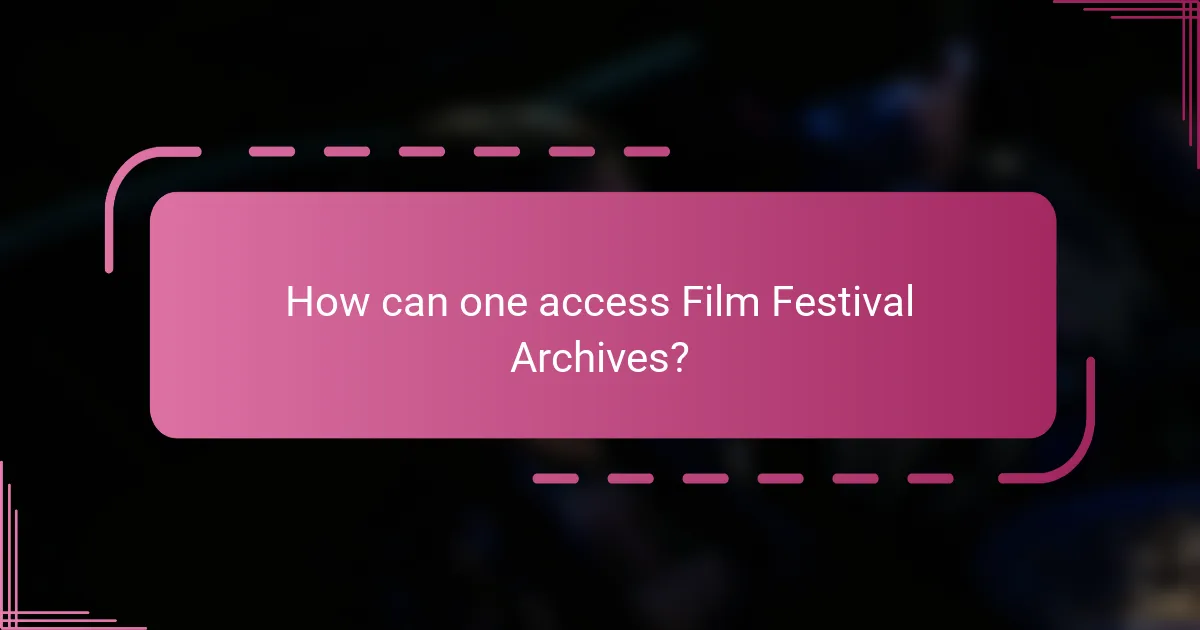
How can one access Film Festival Archives?
One can access Film Festival Archives through official festival websites or dedicated archival institutions. Many festivals maintain digital archives accessible online. These archives often include past screenings, programs, and promotional materials. Some archives may require registration or a fee for access. Physical archives may be available at the festival’s headquarters or affiliated libraries. Additionally, film databases and academic institutions may host collections of festival materials. Researching specific festivals can provide direct links to their archives. Many archives also offer contact information for inquiries regarding access.
What are the common access points for Film Festival Archives?
Common access points for Film Festival Archives include online databases, physical collections, and digital repositories. Online databases often provide searchable catalogs of films, schedules, and festival history. Physical collections may consist of printed materials, such as brochures and programs, housed in libraries or cultural institutions. Digital repositories store video recordings, interviews, and promotional materials accessible via the internet. Access may also be granted through partnerships with educational institutions and film organizations. These access points facilitate research and engagement with film festival history and content.
How do online platforms facilitate access to Film Festival Archives?
Online platforms facilitate access to Film Festival Archives by digitizing and organizing film content. They provide searchable databases that allow users to find specific films or festival information easily. Many platforms offer streaming options for viewing archived films directly online. User-friendly interfaces enhance navigation through extensive collections. Online platforms also include metadata and tagging systems for improved discoverability. They often host virtual events that feature archived films and discussions. Accessibility features ensure that diverse audiences can engage with the content. Overall, these platforms significantly broaden the reach of film festival archives to global audiences.
What role do physical locations play in accessing Film Festival Archives?
Physical locations are crucial for accessing Film Festival Archives. They provide a tangible space where archival materials are stored. These locations often include libraries, cultural institutions, and dedicated archives. Accessing physical archives allows researchers to view original films, documents, and memorabilia. Many archives also host screenings and events related to their collections. Furthermore, staff at these locations can assist with research inquiries. Physical locations often have unique materials not available online. This accessibility enhances the study of film history and festival culture.
What challenges exist in accessing Film Festival Archives?
Accessing Film Festival Archives presents several challenges. Limited funding often restricts the preservation and digitization of materials. Many archives lack adequate staff to manage and maintain collections. Inconsistent cataloging practices can make it difficult to locate specific films or documents. Physical access may be hindered by location and hours of operation. Legal restrictions can prevent public access to certain films due to copyright issues. Additionally, the condition of older materials may pose risks to their accessibility. These factors collectively complicate the process of accessing valuable film festival resources.
How do copyright issues affect access to archived films?
Copyright issues significantly restrict access to archived films. These legal protections limit the ability to reproduce, distribute, or publicly display films without permission. Many archived films are still under copyright, preventing institutions from sharing them freely. This leads to challenges in accessing historical and cultural materials. For example, the U.S. Copyright Act protects works for the life of the author plus 70 years. Consequently, many films from the 20th century remain inaccessible due to copyright restrictions. Additionally, rights holders may demand fees for licensing, further complicating access. As a result, researchers and the public often face barriers to viewing important archived films.
What are the technical barriers to accessing digital archives?
Technical barriers to accessing digital archives include inadequate infrastructure and compatibility issues. Many users lack high-speed internet, which is essential for accessing large digital files. Additionally, outdated hardware may not support modern file formats used in archives. Software limitations can also hinder access, as some archives require specific applications to view content. Furthermore, digital preservation issues can lead to data degradation over time. Security protocols may restrict access to sensitive materials, creating additional hurdles. Lastly, user interface complexity can deter individuals from navigating digital archives effectively.
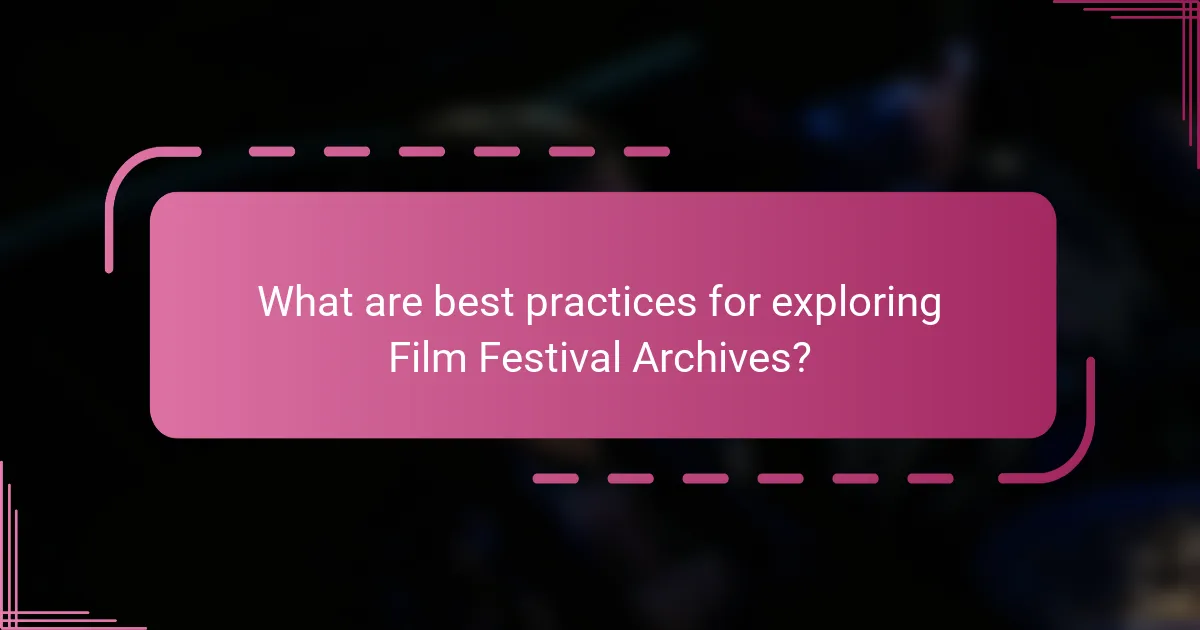
What are best practices for exploring Film Festival Archives?
To explore Film Festival Archives effectively, start by identifying the specific archives of interest. Research the cataloging system used by each archive. Familiarize yourself with the available formats, such as digital collections or physical media. Utilize online databases to access festival programs and past lineups. Attend workshops or seminars offered by archives for deeper insights. Engage with archivists and curators for expert guidance. Document your findings systematically for future reference. Lastly, respect copyright and usage rights when accessing materials. These practices ensure a thorough and respectful exploration of film festival archives.
How can researchers effectively navigate Film Festival Archives?
Researchers can effectively navigate Film Festival Archives by utilizing structured search methods. They should start by familiarizing themselves with the archive’s cataloging system. Understanding the organization of films, events, and documents is crucial. Researchers should also identify key metadata, such as film titles, directors, and screening dates.
Accessing digital databases can enhance the search process. Many archives offer online portals with searchable content. Researchers should take advantage of these tools to filter results based on specific criteria. Attending archival workshops or seminars can provide valuable insights into the research process.
Networking with archivists can yield additional guidance and resources. Archivists often have in-depth knowledge of the collection and can assist in locating specific materials. Lastly, reviewing scholarly articles or case studies related to film festivals can offer context and methodologies for effective navigation.
What tools and resources are recommended for exploring archives?
Recommended tools for exploring archives include digital databases, archival management software, and research guides. Digital databases like Archive.org and Europeana provide access to a wide range of archival materials. Archival management software such as ArchivesSpace helps organize and manage collections effectively. Research guides from institutions like the Society of American Archivists offer valuable insights on navigating archives. Additionally, library catalogs and specialized search engines can enhance discovery. These resources facilitate access to archival content and improve research efficiency in film festival archives.
How can one ensure they maximize their experience in Film Festival Archives?
To maximize your experience in Film Festival Archives, engage actively with the available resources. Familiarize yourself with the archive’s cataloging system to locate films efficiently. Attend workshops or guided tours offered by the archive to gain insights into their collections. Utilize online platforms where many archives provide digital access to films and related materials. Participate in discussions or forums to connect with other film enthusiasts and experts. Take notes during viewings to enhance retention and understanding of the films. Lastly, explore related literature and research to deepen your context and appreciation of the films you encounter.
What tips can enhance the exploration of Film Festival Archives?
Utilize advanced search filters to narrow down specific genres or years in Film Festival Archives. This strategy helps to locate relevant films efficiently. Explore curated collections that highlight significant themes or directors. Curated collections often provide context and enhance understanding. Engage with community forums or social media groups dedicated to film discussions. These platforms can offer insights and recommendations. Attend workshops or webinars focused on archival research methods. Educational events can improve research skills and knowledge. Familiarize yourself with the archive’s cataloging system. Understanding the organization aids in navigating resources effectively. Lastly, consider reaching out to archivists for guidance. Archivists possess expertise and can provide tailored assistance.
How can networking with archivists improve access to materials?
Networking with archivists can significantly improve access to materials. Collaborating with archivists enhances knowledge sharing about available resources. Archivists often have insights into hidden collections and specialized materials. They can provide guidance on navigating archival systems and cataloging practices. Networking fosters relationships that lead to collaborative projects and resource sharing. This collaboration can result in joint initiatives to digitize and preserve materials. Increased visibility of collections through networking can attract researchers and filmmakers. Ultimately, these connections streamline the process of accessing valuable archival content.
What strategies can be used to discover lesser-known films in archives?
Utilizing specialized databases is an effective strategy to discover lesser-known films in archives. These databases often include curated collections from film festivals and archives. Searching through academic databases can yield unique results. Engaging with film scholars and archivists can provide insights into hidden gems. Attending film festivals can expose audiences to lesser-known works. Participating in online forums and film communities can also reveal recommendations. Exploring social media platforms dedicated to film can unearth lesser-known titles. Lastly, utilizing archive catalogs and indexes allows for targeted searches.
Film Festival Archives are collections that preserve and document the history of film festivals, including films, promotional materials, and records of festival activities. This article explores the various formats available in these archives, such as digital video files, physical film reels, and DVDs, and outlines the access points for researchers and the public, including online databases and physical locations. Additionally, it addresses the challenges faced in accessing these archives, including copyright issues and technical barriers, while providing best practices for effective exploration and navigation of Film Festival Archives.
